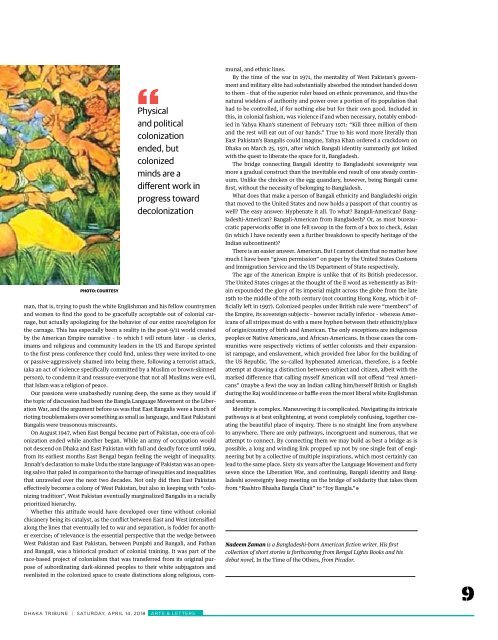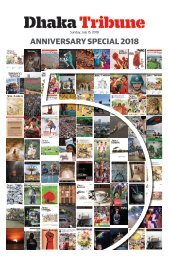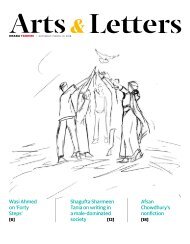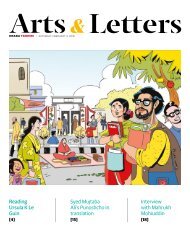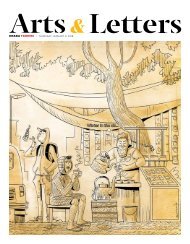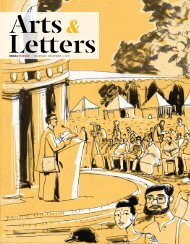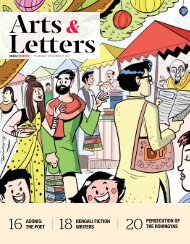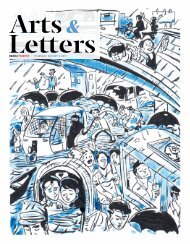Arts & Letters, April 2018
You also want an ePaper? Increase the reach of your titles
YUMPU automatically turns print PDFs into web optimized ePapers that Google loves.
PHOTO: COURTESY<br />
Physical<br />
and political<br />
colonization<br />
ended, but<br />
colonized<br />
minds are a<br />
different work in<br />
progress toward<br />
decolonization<br />
DHAKA TRIBUNE | SATURDAY, APRIL 14, <strong>2018</strong> ARTS & LETTERS<br />
man, that is, trying to push the white Englishman and his fellow countrymen<br />
and women to find the good to be gracefully acceptable out of colonial carnage,<br />
but actually apologizing for the behavior of our entire race/religion for<br />
the carnage. This has especially been a reality in the post-9/11 world created<br />
by the American Empire narrative – to which I will return later – as clerics,<br />
imams and religious and community leaders in the US and Europe sprinted<br />
to the first press conference they could find, unless they were invited to one<br />
or passive-aggressively shamed into being there, following a terrorist attack,<br />
(aka an act of violence specifically committed by a Muslim or brown-skinned<br />
person), to condemn it and reassure everyone that not all Muslims were evil,<br />
that Islam was a religion of peace.<br />
Our passions were unabashedly running deep, the same as they would if<br />
the topic of discussion had been the Bangla Language Movement or the Liberation<br />
War, and the argument before us was that East Bangalis were a bunch of<br />
rioting troublemakers over something as small as language, and East Pakistani<br />
Bangalis were treasonous miscreants.<br />
On August 1947, when East Bengal became part of Pakistan, one era of colonization<br />
ended while another began. While an army of occupation would<br />
not descend on Dhaka and East Pakistan with full and deadly force until 1969,<br />
from its earliest months East Bengal began feeling the weight of inequality.<br />
Jinnah’s declaration to make Urdu the state language of Pakistan was an opening<br />
salvo that paled in comparison to the barrage of inequities and inequalities<br />
that unraveled over the next two decades. Not only did then East Pakistan<br />
effectively become a colony of West Pakistan, but also in keeping with “colonizing<br />
tradition”, West Pakistan eventually marginalized Bangalis in a racially<br />
prioritized hierarchy.<br />
Whether this attitude would have developed over time without colonial<br />
chicanery being its catalyst, as the conflict between East and West intensified<br />
along the lines that eventually led to war and separation, is fodder for another<br />
exercise; of relevance is the essential perspective that the wedge between<br />
West Pakistan and East Pakistan, between Punjabi and Bangali, and Pathan<br />
and Bangali, was a historical product of colonial training. It was part of the<br />
race-based project of colonialism that was transferred from its original purpose<br />
of subordinating dark-skinned peoples to their white subjugators and<br />
reenlisted in the colonized space to create distinctions along religious, communal,<br />
and ethnic lines.<br />
By the time of the war in 1971, the mentality of West Pakistan’s government<br />
and military elite had substantially absorbed the mindset handed down<br />
to them – that of the superior ruler based on ethnic provenance, and thus the<br />
natural wielders of authority and power over a portion of its population that<br />
had to be controlled, if for nothing else but for their own good. Included in<br />
this, in colonial fashion, was violence if and when necessary, notably embodied<br />
in Yahya Khan’s statement of February 1971: “Kill three million of them<br />
and the rest will eat out of our hands.” True to his word more literally than<br />
East Pakistan’s Bangalis could imagine, Yahya Khan ordered a crackdown on<br />
Dhaka on March 25, 1971, after which Bangali identity summarily got linked<br />
with the quest to liberate the space for it, Bangladesh.<br />
The bridge connecting Bangali identity to Bangladeshi sovereignty was<br />
more a gradual construct than the inevitable end result of one steady continuum.<br />
Unlike the chicken or the egg quandary, however, being Bangali came<br />
first, without the necessity of belonging to Bangladesh.<br />
What does that make a person of Bangali ethnicity and Bangladeshi origin<br />
that moved to the United States and now holds a passport of that country as<br />
well? The easy answer: Hyphenate it all. To what? Bangali-American? Bangladeshi-American?<br />
Bangali-American from Bangladesh? Or, as most bureaucratic<br />
paperworks offer in one fell swoop in the form of a box to check, Asian<br />
(in which I have recently seen a further breakdown to specify heritage of the<br />
Indian subcontinent)?<br />
There is an easier answer. American. But I cannot claim that no matter how<br />
much I have been “given permission” on paper by the United States Customs<br />
and Immigration Service and the US Department of State respectively.<br />
The age of the American Empire is unlike that of its British predecessor.<br />
The United States cringes at the thought of the E word as vehemently as Britain<br />
expounded the glory of its imperial might across the globe from the late<br />
19th to the middle of the 20th century (not counting Hong Kong, which it officially<br />
left in 1997). Colonized peoples under British rule were “members” of<br />
the Empire, its sovereign subjects – however racially inferior – whereas Americans<br />
of all stripes must do with a mere hyphen between their ethnicity/place<br />
of origin/country of birth and American. The only exceptions are indigenous<br />
peoples or Native Americans, and African-Americans. In those cases the communities<br />
were respectively victims of settler colonists and their expansionist<br />
rampage, and enslavement, which provided free labor for the building of<br />
the US Republic. The so-called hyphenated American, therefore, is a feeble<br />
attempt at drawing a distinction between subject and citizen, albeit with the<br />
marked difference that calling myself American will not offend “real Americans”<br />
(maybe a few) the way an Indian calling him/herself British or English<br />
during the Raj would incense or baffle even the most liberal white Englishman<br />
and woman.<br />
Identity is complex. Maneuvering it is complicated. Navigating its intricate<br />
pathways is at best enlightening, at worst completely confusing, together creating<br />
the beautiful place of inquiry. There is no straight line from anywhere<br />
to anywhere. There are only pathways, incongruent and numerous, that we<br />
attempt to connect. By connecting them we may build as best a bridge as is<br />
possible, a long and winding link propped up not by one single feat of engineering<br />
but by a collective of multiple inspirations, which most certainly can<br />
lead to the same place. Sixty six years after the Language Movement and forty<br />
seven since the Liberation War, and continuing, Bangali identity and Bangladeshi<br />
sovereignty keep meeting on the bridge of solidarity that takes them<br />
from “Rashtro Bhasha Bangla Chaii” to “Joy Bangla.”•<br />
Nadeem Zaman is a Bangladeshi-born American fiction writer. His first<br />
collection of short stories is forthcoming from Bengal Lights Books and his<br />
debut novel, In the Time of the Others, from Picador.<br />
9


